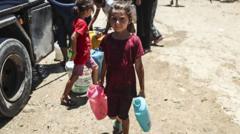As the war in Gaza continues, Israeli Defence Minister Israel Katz has proposed relocating the entire Palestinian population into a designated camp, igniting fears of ethnic cleansing and violations of international law.
Israeli Defence Minister Proposes Relocation of Gazans Amid Ongoing Conflict

Israeli Defence Minister Proposes Relocation of Gazans Amid Ongoing Conflict
Israeli authorities plan to establish a camp in Rafah for the displaced population of Gaza, drawing criticism and concerns over potential humanitarian violations.
Israeli authorities are intensifying their plans for the displacement of Gaza's population as the conflict escalates. Israel's Defence Minister, Israel Katz, has instructed military personnel to devise a scheme aimed at relocating all residents of Gaza to a newly proposed camp in the southern city of Rafah. This initiative is aimed at initially accommodating 600,000 Palestinians, with aspirations to eventually house the entire population of approximately 2.1 million.
Reported by various Israeli media outlets, Katz emphasized the importance of conducting security screenings to ensure that individuals relocated to this camp are not affiliated with Hamas. He stressed that individuals will not be permitted to exit the camp, which raises significant humanitarian and ethical concerns. If conditions permit, the Israeli government plans to commence construction during an anticipated 60-day ceasefire, currently being negotiated between Israel and Hamas.
Human rights advocates have condemned the proposed relocation as a severe violation of international law. Michael Sfard, a prominent Israeli human rights lawyer, labeled the initiative an operational plan for "a crime against humanity," expressing alarm at the potential forcible transfer of an entire population, a maneuver the United Nations explicitly prohibits as it may equate to ethnic cleansing.
The United States has also waded into the conversation, with Israeli Prime Minister Benjamin Netanyahu discussing President Trump's proposal during a recent meeting at the White House. Trump presented the notion of the United States assuming control of post-war Gaza while offering Palestinians the option to remain or leave. Nonetheless, this idea has been met with resistance, particularly from regional Arab states, which back an alternative reconstruction plan aimed at allowing Palestinians to remain in their homeland.
The fear of repetition of past traumas, particularly the Nakba ("catastrophe") when many Palestinians were forcibly displaced during the formation of Israel, looms large among the population. Alongside these tensions, an alarming toll has emerged from the ongoing military conflict, with the Hamas-run health ministry in Gaza reporting over 57,500 fatalities since the start of Israeli military operations following a deadly attack on October 7, 2023, that claimed about 1,200 lives.
With more than 90% of homes in Gaza damaged or destroyed and basic infrastructure in ruins, including healthcare, water, sanitation, and food supplies, the humanitarian crisis deepens. As discussions of a potential ceasefire unfold, the situation remains precarious for the millions of individuals caught in the conflict.




















